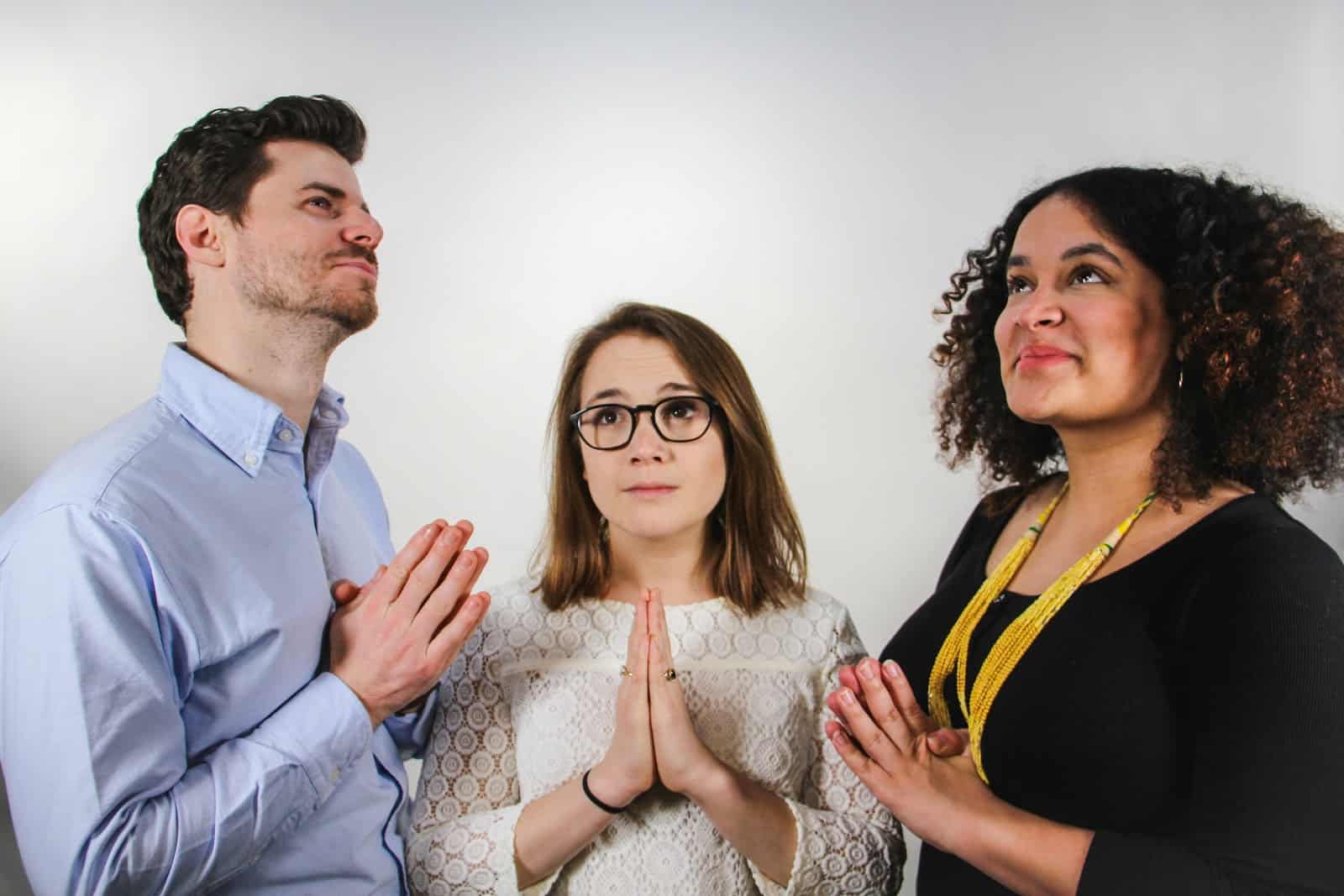TJP recently had the opportunity to talk with Olga Segura, an associate editor at America Media. Born in the Dominican Republic, Olga grew up in the Bronx and attended Fordham University. She is one of the co-hosts of the popular “Jesuitical” podcast, a weekly podcast hosted by three young, lay editors at America Media.
Tell us how the “Jesuitical” podcast came to be?
The idea for the podcast happened over lunch one day. Ashley and Zac, my co-workers at America Media, decided that there was a niche missing in the podcast world, i.e., there were no podcasts for young Catholics. Ashley loves The Tablet’s “Unorthodox,” which offers a take on Jewish news and culture—so we decided to do the same, but for Catholic news and culture.
In February, the “Jesuitical” podcast passed the one-year mark. What do you think has helped make it into such a success?
One of the things that has helped to make it successful is that all three of us co-hosts believe in the mission. We are trying to build a community, a space for fellow young Catholics to learn more about their own faith and to engage with other like-minded individuals.
A second factor that has allowed us to be successful is that the three of us come from three totally different backgrounds. We don’t always see eye-to-eye on everything we discuss, but we’re willing to listen and to learn from the other’s perspectives—and I think that resonates with our listeners.
You have had the chance to interview a lot of people since the podcast began. Who has been your favorite interview?
I think my favorite interview is our latest one with Cyrus Habib, the lieutenant governor of Washington State. He’s not only brilliant and extremely accomplished, but he also gave me hope for the state of U.S. politics.
Social media has been under a lot of scrutiny lately, including Mark Zuckerberg’s recent testimony before Congress. What’s your view of social media? How can it be a tool of evangelization? What are the risks?
I absolutely love social media! It has helped me to grow as a Christian and as a feminist. There are so many brilliant women of color that I have gotten introduced to via Twitter, such as Zoé Samudzi, Zahira Kelly-Cabrera and Juleyka Lantigua-Williams. These women—and so many others—have allowed me to challenge prejudices I grew up with and grow as a thinker and writer. I think social media, especially Twitter, can be such a powerful tool for evangelization because you can reach people anywhere in the world and engage in meaningful dialogue.
I think one of the challenges that can be found on a platform like Twitter, however, is that it often becomes more about building a brand for yourself rather than about getting across whatever message you believe in.
Many faithful Catholics lament the growing secularization that they see in Western culture and the lack of religious practice among youth. As a young adult working in Catholic media, what’s your take?
While the worry is valid—numbers are showing a growth of secularization—I think that, unlike previous generations, I am able to live out my faith in ways that do not necessarily look like those of previous generations, e.g., social media, Google Hangouts, podcasting! These platforms, especially being on the podcast, allow me to see how my co-hosts and our young listeners live out their faith, so I’m constantly immersed.
Your podcast has given voice to many people, from Black Catholics and Catholic feminists to Muslim and Jewish Americans. What voices do you feel are not being heard in the Church today? And how do you think the Church can do better to hear those voices?
I think the Church, more than most institutions, is doing a better job of giving voices to marginalized communities. For example, the Catholic Church has done so much for undocumented Americans, from statements from the U.S. Conference of Catholic Bishops (U.S.C.C.B.) to churches acting as sanctuaries to the handing out of church IDs in Texas. We’ve also seen how impactful voices like those of Father James Martin, S.J., have been for L.G.B.T. Catholics.
That being said, however, the Church can and should always do more for Catholics of color. Things like Charlottesville last year, the rhetoric of many in government, the demonization of black men and women, mass incarceration and the various instances of police officers getting called on black Americans prove that America has never been the post-racial world that many Christians want to believe in. And, in many ways, the Church has already started to reconcile with its own complicity in America’s racist history, from Georgetown acknowledging its own problematic history to the formation of the U.S.C.C.B’s Ad-Hoc Committee Against Racism. I want to see even more of this.
Earlier this year, America Magazine released the most comprehensive survey of U.S. Catholic women. What has your experience been as a woman in the Catholic Church? And as a woman working in Catholic media?
Growing up, I always had examples of women in the church in my life—from my mother to girl altar servers at my parish growing up to the nuns at my high school. Catholicism was always something that included women. When I started working at America, however, I realized that this wasn’t everyone’s experience.
Initially, I wasn’t comfortable being vocal and letting my ideas be heard. I was constantly worried about being a woman, especially one of color, and saying the wrong thing. However, over time, I’ve learned to leave those fears behind, especially thanks to the wonderful support and leadership of women like Kerry Weber, the executive editor at America who spearheaded the survey.
What was your familiarity with Jesuits and Ignatian spirituality before joining America Media? What have been your greatest personal takeaways from Ignatian spirituality?
Aside from attending a Jesuit university, I did not know much about the Jesuits or Ignatian spirituality. Learning more about Ignatian spirituality has been one of the greatest things about “Jesuitical.” I love how it has challenged me—the Daily Examen is not as easy as I originally thought!—and helped me to grow as a Catholic.
Besides deeping your knowledge of Ignatian spirituality, how has working at America Media and with the “Jesuitical” podcast impacted the practice of your own faith life? How has it impacted your views of the Church today?
Working at America Media and “Jesuitical” has definitely strengthened my faith life. In college, I grew away from the faith. I no longer had nuns or teachers or parents telling me I had to go to weekly Mass. But being at America, and especially working on “Jesuitical,” has allowed me to take ownership of my faith and to be more intentional about prayer, worship, going to weekly services and reading the Bible.
Working at America has also made me aware of all the great work that local parishes do around the world. Prior to being at America, I had a very secular and negative understanding of the Church, i.e., it was anti-women, anti-people of color, anti-L.G.B.T. Catholics, etc. In six years, I have gotten to meet so many amazing Catholics that are spreading the Gospel and truly attempting to represent marginalized communities. I’ve realized that the Church isn’t just popes, bishops, cardinals, church hierarchy—it’s also the single mothers, sexual abuse survivors, Black Lives Matter activists.
The podcast requires a certain level of vulnerability as the three of you co-hosts share “consolations and desolations” of the week, moments where you find God at work and in your lives, and moments when it was harder. How has this experience of being vulnerable in a public way been for you?
Sometimes, it’s the easiest part of the show! I’m an extrovert and I tend to overshare, so being vulnerable, being emotional, has never been a challenge for me. Other times, especially when I am describing something specific to my experience as a woman of color, it feels like the hardest conversation I can have.
Thanks for sharing, Olga. Both with us, and on your weekly podcast. We’ll let you out of here with one final question. (You had to expect this to be coming.) If you could canonize someone, living or dead, Catholic or not, who would it be? And why?
Ha! I love when we get this question! The first time I was asked, during one of our live shows, I chose James Baldwin. Now, I’m going to choose Francisca and Julio Segura, also known as my parents. They left the Dominican Republic in the early 1990s and arrived at John F. Kennedy Airport in New York City. They spoke no English and had only $90. They have struggled and been through various traumas and endured through it all. They gave my sister and me the courage and faith to believe in ourselves. And for that, I nominate them.
***
Image courtesy of Angelo Jesus Canta.


